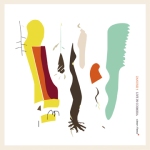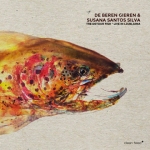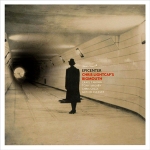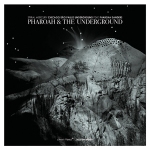Albums of the Year – 2014
So another year and another 1500 albums considered for review (and that’s just the ones we actually added to the list!). Taking a quick look back: this year Julian, Matthew, Chris, Ed, Antonio, Stefan, Josh, and Hugo joined the review team and we recently welcomed Eyal and Alfonso – you’ll be seeing more of them soon. 2014 also saw Martin Schray bringing the Free Jazz Blog to the air on SWR2, public radio in southern Germany. His next show is on the 9th of January (stay tuned for more info on that!). Finally, thanks to all of you, we’re seeing upwards of 75,000 page views a month and have a growing subscriber base … all we can (and should) say is thank you everyone and keep listening!
And now here it is … our hotly anticipated top ten list of albums of the year, tallied and calculated from the collective’s personal top 10 album choices (listed below):
The Free Jazz Collective Top-10 albums of 2014

1.Steve Lehman Octet – Mise en Abîme
2.Akira Sakata, Johan Berthling, Paal Nilssen-Love – Arashi
3.Jemeel Moondoc – The Zookeeper’s House
4.Angles 9 – Injuries (CF 303)
5.Audio One – An International Report
6.Farmers By Nature – Love and Ghosts
7.Ken Vandermark/Paal Nilssen-Love Duo – Lightning Over Water
8.Marc Ribot Trio – Live at the Village Vanguard
9.Wadada Leo Smith – The Great Lakes Suites
10.Jeremiah Cymerman – Pale Horse / Lotte Anker & Jakob Riis – Squid Police
Troy Dostert

1.Steve Lehman Octet, Mise en Abîme
2.Marty Ehrlich Large Ensemble – Trumpet in the Morning
3.Franco D’Andrea Sextet – Monk and the Time Machine
4.Kris Davis Trio – Waiting for You to Grow (CF 292)
5.Ivo Perelman – The Other Edge
6.Ken Vandermark/Paal Nilssen-Love Duo – Lightning Over Water
7.Peter Van Huffel – Boom Crane
8.Angles 9 – Injuries
9.Max Johnson – Invisible Trio
10.Audio One – An International Report
Julian Eidenberger

1.Akira Sakata, Johan Berthling, Paal Nilssen-Love – Arashi
2.Kyle Bruckmann’s Wrack – … Awaits Silent Tristero’s Empire
3.Steve Lehman Octet – Mise en Abîme
4.Anthony Braxton, Tom Rainey, Tomas Fujiwara – Trio New Haven 2013
5.Audio One – An International Report
6.Many Arms with Colin Fisher – Suspended Definition
7.Lean Left – Live at Area Sismica
8.Joe Morris Quartet – Balance (CF 306)
9.Yoni Kretzmer, Pascal Niggenkemper, Weasel Walter – Protest Music
10.Wadada Leo Smith, Jamie Saft, Joe Morris, Balázs Pándi – Red Hill
Matthew Grigg


1.Pharoah & the Underground – Spiral Mercury/Primative Jupiter (CF 300)
2.Audio One – An International Report/The Midwest School
3.Nicole Mitchell’s Black Earth Ensemble – Xenogenesis II: Intergalactic Beings
4.Nate Wooley, Hugo Antunes, Chris Corsano – Malus
5.Thurston Moore, Gabriel Ferrandini, Pedro Sousa – Live at ZDB (SHH 010)
6.Peter Evans Quintet – Destination:Void
7.Broetzmann, Adasiewicz, Edwards, Noble – Mental Shake
8.Roscoe Mitchell/Mike Reed – In Pursuit of Magic
9.Jason Ajemain, Tony Malaby, Rob Mazurek, Chad Taylor – A Way A Land of Life
10.Marc Ribot Trio – Live at the Village Vanguard
Chris Haines


 1.Joe Morris Quartet – Balance (CF 306)
1.Joe Morris Quartet – Balance (CF 306)
2.Sei Miguel – Salvation Modes (CF 295)
3.Eric Revis – In Memory of Things Yet Seen (CF 294)
4.Jakob Thorkild Trio – Art Sleaze
5.Tisziji Munoz – Star Worlds
6.Ken Aldcroft – Threads 10/09/11
7.Marc Ribot – Live at the Village Vanguard
8.Andymusic – Heavydance
9.Tomas Fujiwara Trio – Variable Bets
10.Tellef Ogrim & Anders Berg – November
Antonio Poscic

1.Wadada Leo Smith – The Great Lakes Suites
2.Steve Lehman Octet – Mise en Abîme
3.DKV Trio – Sound in Motion in Sound
4.Farmers By Nature – Love and Ghosts
5.Lotte Anker & Jakob Riis – Squid Police
6.Jeremiah Cymerman – Pale Horse
7.Angles 9 – Injuries (CF 303)
8.Tyshawn Sorey Trio – Alloy
9.Zion 80 – Adramelech: Book of Angels, Vol. 22
10.Jemeel Moondoc – The Zookeeper’s House
Dan Sorrells


1.Daunik Lazro, Benjamin Duboc, Didier Lassere – Sens Radiants
2.Wacław Zimpel To Tu Orchestra – Nature Moves
3.Benjamin Duboc – St. James Infirmary
4.Zanussi Five – Live in Coimbra (CF 314)
5.Angles 9 – Injuries (CF 303)
6.Max Johnson, Ingrid Laubrock, Mat Maneri, Tomas Fujiwara – The Prisoner
7.Keir Neuringer – Ceremonies Out of the Air
8.Jeremiah Cymerman, Evan Parker, Nate Wooley – World of Objects
9.RED Trio & Mattias Ståhl – North and the Red Stream
10.Michael Francis Duch – Tomba Emmanuelle
Hugo Truyens


1.De Beren Gieren & Susana Santos Silva – The Detour Fish (CF 317)
2.1000 + 1 – Butterfly Garden
3.East of the Sun – ICP Orchestra
4.Os Meus Shorts – Os Meus Shorts II
5.Sylvain Rifflet & Jon Irabagon – Perpetual Motion (A Celebration of Moondog)
6.Baloni – Belleke (CF 305)
7.Ideal Bread Beating The Teens – Songs Of Steve Lacy
8.Franco D’Andrea Sextet – Monk and the Time Machine
9.Marc Ribot Trio – Live at the Village Vanguard
10.Sylvie Courvoisier – Mark Feldman Quartet Birdies for Lulu
http://www.freejazzblog.org/2014/12/albums-of-year-2014.html
 Chris Lightcap’s Bigmouth – Epicenter (CF 315)
Chris Lightcap’s Bigmouth – Epicenter (CF 315)














